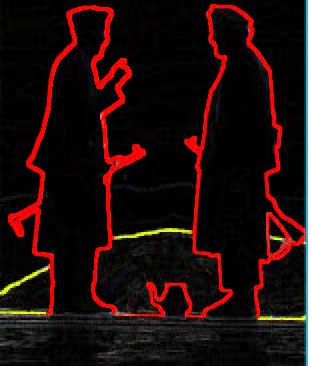Halfway between Tel Aviv and Jerusalem, in an area of agricultural villages, we visited the I.M.I. Academy for
Advanced Security and Anti-Terror Training. The Academy offers a broad range of high level security,
counter-terror and anti-crime, together with intelligence and counter-intelligence training. These services are
offered to local and foreign government agencies, as well as private institutions. Its interdisciplinary team is
made up of former commanders from elite Israeli security units. They have been chosen for their experience, and
their ability to pass on their expertise to others. The Academy exposes the trainees to crisis simulation
exercises.
A variety of crisis situations are incorporated into the training. The trainees are taught to respond to open field
terrorist situations, or possibly a scenario where a building occupied by terrorist, must be stormed.. In order to
meet the challenges of these unusual crisis situations, the trainees are required to gain expertise in
close-quarter combat, urban warfare, hostage release, operational driving, sharp-shooting, and personal
security. The military hardware required for anti-terror operations is supplied by Israel Military Industries, which
has acquired development and manufacturing experience over a period of more than 65 years. I.M.I. specializes in
producing small arms and small arms ammunition.
"We chose this site from among the 18 producing plants that the Israel Military Industries has throughout Israel.
We chose this location as it is in between Tel Aviv and Jerusalem, and not far from our international airport. The
new Route 6 from Beersheva, now under construction will pass next to us. It is like Route 95 in the States, and
will put us only five minutes driving time from the Ben Gurion International Airport," said Mr. Yigal Levin director of
the Academy. He explained that the training area is a totally secure place, and trainees receive advanced
on-the-ground training.
The campus includes advanced security systems, electronic fences, with combat posts and patrols. The
Academy includes a complex high-tech firing range. Martial Arts were added to the training centers. "As we are
talking here in my office, an anti-terror group from the Far East is undergoing an intensive course," stated Mr.
Levin.
Since its formation, Russians, South Americans and Africans have taken advantage of the company's
specialized training.
Mr. Levin has a wealth of experience in security and training. He was deputy head of security services (Shin Bet)
and retired holding a rank equivalent to that of general. He subsequently founded his own company. "The idea for
creating an academy was always in the back of my head, but it began to take shape in 1998. It took one year to
make all the agreements with IMI and to create the infrastructure before we opened the Academy", he points out.
Anti-terror education comes at a cost. One month's course in Israel costs between $10,000 and $11,000 per
trainee. Higher prices are charged when the course requires an unusually large amount of ammunition. Courses
vary in duration from one week to six months.
The training area was full of movement and activity as the participants in the course were exposed to various
situations requiring an instantenous responses.
The staccato sound of firing reverberated throughout the area, as members of the special VIP units were being
coached to improve the speed and accuracy of firing.
"Can the courses now offered at the Academy, be applied for what is now needed in the United States?" we
asked Mr. Levin. American units will not be visiting the Academy, however, Mr. Levin is about to travel to the
United States. He is optimistic that negotiations will result in the establishing of a similar academy in the U.S.
Until most recently, airline hijackings were rare since hijacked planes could not stay in the air forever and few
countries were willing to let them land.
All of that changed on September 11, when four hijacked planes were used as instruments of destruction. It is to
be expected that the American civilian air industry is ready to acquire and to implement expertise for preventing
terrorists from boarding flights.
Implementing anti-terror expertise undoubtedly will go a long way to rebuilding the shattered confidence of the
American public, which is at present staying away from flying.
A very convincing argument for implementing this program is that El Al Israel's airlines, has not experienced a
successful hijacki in over 30 years. Each El Al flight has on board one or two security agents who are ready to
act against threats at any given moment, as well as armored cockpit doors, and probably much more...
 IHTIR's visit to the IMI Academy for Security and Anti Terror Training took place one day after Israeli Tourism
Minister Rahavam Zeevi was assassinated by Arab terrorists. The assassins infiltrated into the Jerusalem Hyatt
Hotel, and gunned down the Israeli parliamentarian as he was returning from an early breakfast to his room. The
assassination was immediately seen as a failure of Israel's security services. However, associates of Mr. Zeevi
revealed that he would not allow Secret Service guards to accompany him in the course of his everyday
activities.
IHTIR's visit to the IMI Academy for Security and Anti Terror Training took place one day after Israeli Tourism
Minister Rahavam Zeevi was assassinated by Arab terrorists. The assassins infiltrated into the Jerusalem Hyatt
Hotel, and gunned down the Israeli parliamentarian as he was returning from an early breakfast to his room. The
assassination was immediately seen as a failure of Israel's security services. However, associates of Mr. Zeevi
revealed that he would not allow Secret Service guards to accompany him in the course of his everyday
activities.